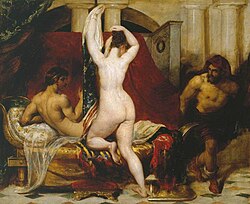
Candaules (died c.687 BC; Greek: Κανδαύλης, Kandaulēs), also known as Myrsilos (Μυρσίλος),[1] was a king of the ancient Kingdom of Lydia in the early years of the 7th century BC. According to Herodotus, he succeeded his father Meles as the 22nd and last king of Lydia's Heraclid dynasty. He was assassinated and succeeded by Gyges.[1][2]
Based on an ambiguous line in the work of the Greek poet Hipponax, it was traditionally assumed that the name Candaules meant "hound-choker" among the Lydians.[3] J. B. Bury and Russell Meiggs (1975) say that Candaules is a Maeonian name meaning "hound-choker".[2] More recently, however, it has been suggested that the name or title Kandaules is cognate with the Luwian hantawatt(i)– ("king") and probably has Carian origin.[4] The name or title of Candaules is the origin of the term candaulism, a sexual practice which legend attributed to him.[5]
Several stories of how the Heraclid dynasty of Candaules ended and the Mermnad dynasty of Gyges began have been related by different authors throughout history, mostly in a mythical vein. In Plato's Republic, Gyges used a magical ring to become invisible and usurp the throne, a plot device which has reappeared in numerous myths and works of fiction throughout history.[6] The earliest story, related by Herodotus in the 5th century BC, has Candaules betrayed and executed by his wife.[7]
- ^ a b Herodotus 1975, p. 43
- ^ a b Bury & Meiggs 1975, p. 82
- ^ Liddell, Henry George; Scott, Robert. "A Greek-English Lexicon ("Κανδαύλης")". Perseus Digital Library. Clarendon Press. Retrieved 3 July 2018.
- ^ Szemerényi, Oswald, "Etyma Latina II (7-18)", Studi Linguistici in onore di Vittore Pisani. Brescia: Paideia. V. 2, 1969, pp. 963–994; Yakubovich, Ilya, Sociolinguistics of the Luwian Language, Leiden: Brill, 2010, pp. 94-95.
- ^ Richard von Krafft-Ebing in his book: Psychopathia sexualis. Eine klinisch-forensische Studie (Stuttgart: Enke 1886).
- ^ Plato 1987, pp. 46–47
- ^ Herodotus 1975, pp. 43–46